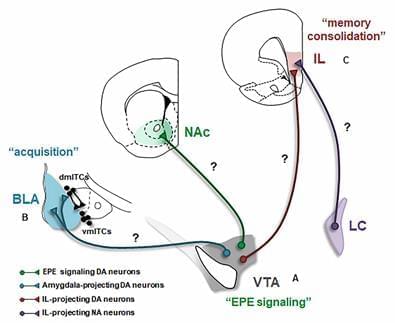The ability to extinguish fear memories when threats are no longer present is critical for adaptive behavior. Fear extinction represents a new learning process that eventually leads to the formation of extinction memories. Understanding the neural basis of fear extinction has considerable clinical significance as deficits in extinction learning are the hallmark of human anxiety disorders. In recent years, the dopamine (DA) system has emerged as one of the key regulators of fear extinction. In this review article, we highlight recent advances that have demonstrated the crucial role DA plays in mediating different phases of fear extinction. Emerging concepts and outstanding questions for future research are also discussed.
Learning to associate stimuli and situations with danger or safety is critical for survival and adaptive behavior. In the laboratory, these forms of learning are typically studied using Pavlovian fear conditioning and extinction. Fear conditioning is an example of associative learning in which an initially neutral stimulus such as a tone (conditioned stimulus, CS) comes to elicit fear responses after being paired in time with an aversive outcome such as a foot shock (unconditioned stimulus, US). Once the CS-US association is learned, subsequently repeated presentations of the CS in the absence of the aversive US result in a gradual decrease in conditioned fear responses, a process known as fear extinction. In the last decades, fear extinction has attracted much interest in part because deficits in extinction learning are thought to underlie human anxiety disorders, such as post-traumatic stress disorder (PTSD) and phobias (Graham and Milad, 2011; Pitman et al., 2012; Craske et al.
